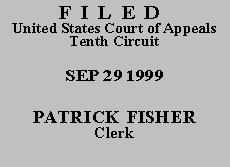

| GUY GRANVILLE WILLIAMS,
v.
H. N. SCOTT |
No. 99-6165
(D.C. No. CIV-98-614-R) |
Following pleas of guilty to murder in the first degree and assault and battery with a deadly weapon with intent to kill, Williams was sentenced, on September 30, 1981, to two concurrent terms of life imprisonment. At sentencing, Williams, represented by counsel, waived Oklahoma's normal 10-day period in which to file a direct appeal of his conviction. He did not move to withdraw his guilty pleas or to file a direct appeal.
Williams first sought to challenge his conviction and sentence in an application for state post-conviction relief, filed in January 1983. He argued that his guilty pleas were tainted with unconstitutionality due to the failure of the trial court and counsel to advise him as to the nature and essential elements of the crimes to which he had pled guilty; and that failure to advise him of those matters was tantamount to ineffective assistance of counsel. The state district court denied Williams' application on May 4, 1983, finding his claims to be without merit, and Williams appealed. The Oklahoma Court of Criminal Appeals affirmed the denial of his application in an order filed on May 12, 1983.
In a second application for state post-conviction relief, filed in August 1996, Williams claimed that the trial court denied him the right to appeal by failing to inform him of his right to be represented by appointed counsel on direct appeal. The district court held that Mr. Williams' new claim was barred under the Oklahoma Post-Conviction Procedure Act, 22 Okla. Stat. Ann §§ 1080-87, which states:
All grounds for relief available to an applicant under this act must be raised in his original, supplemental or amended application. Any ground finally adjudicated or not so raised, or knowingly, voluntarily and intelligently waived in the proceeding that resulted in the conviction or sentence or in any other proceeding the applicant has taken to secure relief may not be the basis for a subsequent application unless the court finds a ground for relief asserted which for sufficient reason was not asserted or was inadequately raised in the prior application.
22 Okla. Stat. Ann. § 1086. The Oklahoma Court of Criminal Appeals affirmed, reiterating the district court's holding that his new claim was procedurally barred and stating that he had "failed to provide a sufficient reason for this failure to present his claim within his first post-conviction application."
In May 1998 Williams filed a petition for a writ of habeas corpus in federal district court. The district court denied Williams relief on both his claims on the grounds that they are procedurally barred by his failure to raise them in his first petition for post-conviction relief, adding that even if his claims had not been procedurally barred, the court deny the petition on the merits.
We agree with the district court that Oklahoma's procedural bar rule is "independent" and "adequate" and that William's failed to show "cause and prejudice" or a "fundamental miscarriage of justice" sufficient to overcome his procedural default of his right to appeal claim. See Coleman v. Thompson, 501 U.S. 722, 750 (1991).
Williams also claims that the Oklahoma courts denied him evidentiary hearings on his second post-conviction petition in violation of their procedural rules. Even if Williams could overcome his procedural default, he is not entitled to a certificate of appealability because we can find no indication that Oklahoma violated its own rules of judicial procedure by failing to grant Williams evidentiary hearings on his post-conviction petitions. Under the Oklahoma Post-Conviction Procedure Act, 22 Okla. Stat. Ann. § 1084, an Oklahoma court must conduct an evidentiary hearing on appeal only "[i]f the application cannot be disposed of on the pleadings and record, or there exists a material issue of fact." In the present case, Williams has made no showing either that the application could not be resolved on the pleadings and record or of a material issue of fact. Williams fails to present any cognizable federal due process claim.
A certificate of appealability is DENIED. This matter is DISMISSED.
ENTERED FOR THE COURT,
Carlos F. Lucero
Circuit Judge
*.The case is unanimously ordered submitted without oral argument pursuant to Fed. R. App. P. 34(a)(2) and 10th Cir. R. 34.1(G). This order and judgment is not binding precedent, except under the doctrines of law of the case, res judicata, and collateral estoppel. The court generally disfavors the citation of orders and judgments; nevertheless, an order and judgment may be cited under the terms and conditions of 10th Cir. R. 36.3.